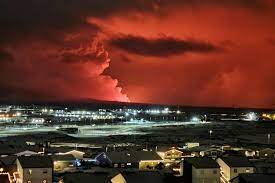
REYKJAVIK, Dec 21, 2023 (BSS/AFP) - Evacuated residents of the Icelandic
town of Grindavik returned Thursday for daytime visits as a nearby volcanic
eruption appeared to be petering out, though their hopes of spending Christmas
at home were dashed.
The eruption, which began on Monday evening, opened a fissure in the ground
about four kilometres (2.5 miles) long, spewing glowing fountains of orange
lava into the sky only three kilometres from Grindavik.
By Thursday, the Icelandic Meteorological Office (IMO) said that during a
surveillance flight "no volcanic activity was observed and it seems as though
there is no activity in the craters."
"The volcanic activity seems to have come to an end late last night or
early (Thursday) morning," it said.
"Despite that, it is possible that lava is flowing underneath the lava coat
in lava tubes and therefore it is not possible to say that the eruption is
over."
Late Wednesday, the IMO had said the likelihood of a new eruption forming
without warning near Grindavik had decreased.
Authorities therefore allowed the town's 4,000 residents access to the
small fishing port between 7:00 am and 4:00 pm.
They were evacuated on November 11 after a series of earthquakes,
considered a possible precursor to an eruption.
First responders were present in the town on Thursday in case an emergency
evacuation was required.
Some returning residents were quick to get back to work, including the
staff at fishing company Thorfish who rushed to save the catch caught just
before the eruption.
"Now they are trying to pack it and prepare it so it won't get damaged, and
then clean up the whole place for Christmas," Jon Emil, purchasing manager for
Thorfish, told AFP outside the packing plant.
- 'Very different' Christmas -
Authorities still say it is unsafe to stay in the town overnight, and have
informed residents they will not be able to return to stay in their homes
before Christmas.
Bergsteinn Olafsson, a 59-year-old municipal worker from Grindavik, told
AFP that Christmas this year would therefore be "different, very different".
"But if you have your family, everything is ok."
Some said they had no plans to return to their homes ever again.
Sigurdur Oli Porleifsson, a father of four who works in the fishing
industry, said his house and those nearby were all set for demolition, due to
cracks in their structure caused by the earthquake swarm in early November.
"All these houses are all tilting and they are cracked. They will all be
demolished... they're not repairable."
But others said they had no choice but to return once authorities give the
green light.
"We can't pay a loan on the house and rent, it's not possible. So we have
to come back," said 50-year-old former fisherman David Arnason.
"Nobody wants to buy our house, we can't sell it," he added.
But his family is not keen on living in Grindavik again due to the eruption
risk.
"We never know what's going to happen... It's pretty frightening," he said.
"My kids don't want to come back. And my daughter has already found another
place to live, she has a little boy."
Volcanic eruptions are common in Iceland, which is home to 33 active
volcano systems, the highest number in Europe.
But until 2021, the Reykjanes peninsula had not experienced an eruption for
eight centuries.
Since then, eruptions have struck in 2021, 2022 and earlier this year --
all in remote, uninhabited areas. Volcanologists say this could be the start of
a new era of activity in the region.